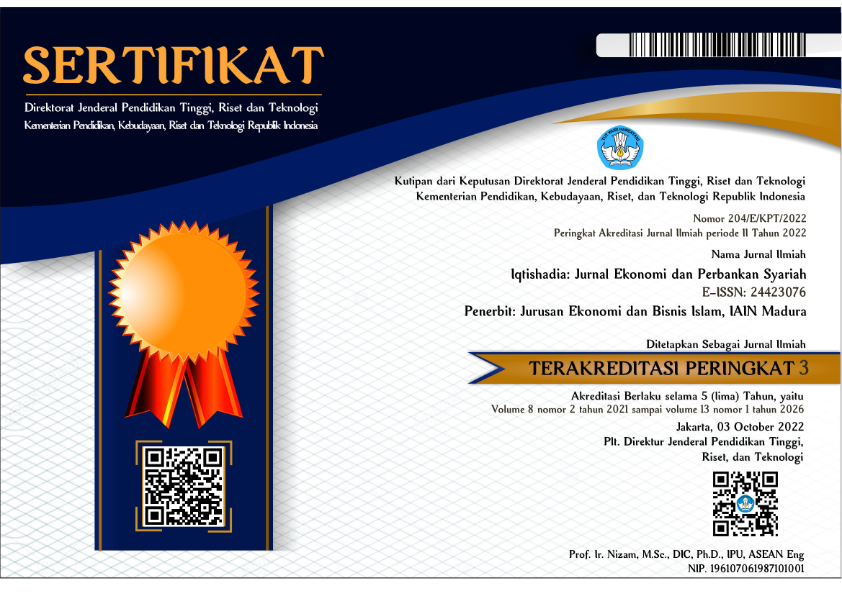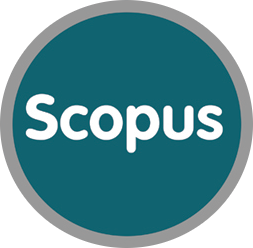Pengaruh Sumber Daya Manusia dan Ekonomi Kreatif pada Peningkatan Parawisata Halal Pantai Lon Malang di kabupaten Sampang
 Abstract views: 176
,
Abstract views: 176
,
 pdf downloads: 202
pdf downloads: 202
Abstract
Madura Island has many halal tourism destinations that need to be developed, one of which is Lon Malang beach which is located in Sampang Regency, the Regency is known for its people who are very thick with Islamic teachings. This study aims to determine the factors that influence the increase in Halal Tourism in terms of human resources and creative economy. The population and sample in this study were 91 respondents consisting of 37 administrative staff and 54 field workers who are creative economic actors in the halal tourism area of Lon Malang Beach, Sampang Regency, using a quantitative descriptive approach. The data analysis method uses measurement model analysis (Outer Model) and structural model analysis (Inner Model), while hypothesis testing uses t statistical test (partial) and f statistical test (simultaneous) which is assisted by statistical aids, namely SmartPLS version 3.0 software. The results showed that: 1) Human Resources has a significant effect on increasing halal tourism, 2) Creative Economy has a significant effect on Increasing Halal Tourism, 3) Human Resources and Creative Economy have a significant effect simultaneously on Increasing Halal Tourism.
Downloads
References
Andriyani, Andriyani. “Kajian Literatur Pada Makanan Dalam Perspektif Islam Dan Kesehatan.” Jurnal Kedokteran Dan Kesehatan, 2019. https://doi.org/10.24853/jkk.15.2.178-198.
Apriliani, Kadek, and I Made Sudirga. “PROGRAM WONDERFUL INDONESIA DALAM PENGATURAN UNDANG-UNDANG NO 10 TAHUN 2009 TENTANG KEPARIWISATAAN.” Kertha Semaya : Journal Ilmu Hukum 10, no. 3 (February 5, 2022): 596. https://doi.org/10.24843/KS.2022.v10.i03.p10.
Astuti, Dewi, Anton Minardi, and Rizky Aditya Surya Prathama. “COMMUNITY EMPOWERMENT TOWARDS WORLD HALAL TOURISM IN CREATIVE VILLAGE OF SUKARUAS TASIKMALAYA.” Journal of Economic Empowerment Strategy (JEES) 5, no. 1 (February 21, 2022). https://doi.org/10.23969/jess.v5i1.4934.
Ika, Rony, and Setiawan. “Pengembangan Sumber Daya Manusia Di Bidang Pariwisata: Perspektif Potensi Wisata Daerah Berkembang.” Jurnal Penelitian Manajemen Terapan (PENATARAN), 2022.
Kurniawan, Sandyka, and Sidik Jatmika. “Japan’s Challenges on Muslim Friendly Tourism to Attract Muslim Tourists 2013-2019.” Journal of Islamic World and Politics 5, no. 2 (November 12, 2021): 313–3325. https://doi.org/10.18196/jiwp.v5i2.9833.
Lestari, Lily Arsanti, Yuny Erwanto, and Abdul Rohman. “Falsafah Sains Halal.” Pustaka Pelajar, 2023.
Moleong, LJ. “Metodologi Penelitian.” Kualitalif Sasial, 2006.
Pratama, Erik Dian, Ambar Lukitaningsih, and Nonik Kusuma Ningrum. “Pengaruh Brand Awareness, Consumer Trust, Percived Value, Dan Word of Mouth Terhadap Purchase Intention Konsumen Situs Belanja Online Shopee Di Yogyakarta.” Al-Kharaj : Jurnal Ekonomi, Keuangan & Bisnis Syariah 4, no. 6 (July 2, 2022): 1762–72. https://doi.org/10.47467/alkharaj.v4i6.1084.
Rahmawati, Fanni. “Pilar-Pilar Yang Mempengaruhi Perkembangan Ekonomi Kreatif Di Indonesia.” Economic Education and Entrepreneurship Journal 4, no. 2 (November 21, 2021): 159–64. https://doi.org/10.23960/E3J/v4i2.159-164.
Suaibah, Lilis, Makhtum Ahmad, Busro Karim, and Mokh Rum. “Strategi Pengembangan Daya Tarik Wisata Pantai Lon Malang Kabupaten Sampang.” In Annual Conference on Islamic Economic and Law, 2019.
Subarkah, Awafi Ridho, Junita Budi Rachman, and Akim. “Destination Branding Indonesia Sebagai Destinasi Wisata Halal.” Jurnal Kepariwisataan: Destinasi, Hospitalitas Dan Perjalanan, 2020. https://doi.org/10.34013/jk.v4i2.53.
Sugiyono. Metode Penelitian Kuantitatif, Kualitatif,Dan R&D. Alfabeta, Cv. Bandung: Alfabeta, cv., 2016.
Suning, Suning, Hasri Wahyuni, and Rhenny Ratnawati. “Kajian Pengembangan Kawasan Wisata Berkelanjutan Di Pantai Lon Malang Kabupaten Sampang, Madura.” Jurnal Pembangunan Wilayah Dan Kota 19, no. 4 (December 31, 2023). https://doi.org/10.14710/pwk.v19i4.49835.
Susan, Eri. “MANAJEMEN SUMBER DAYA MANUSIA Eri Susan 1.” Jurnal Manajemen Pendidikan, 2019.
Ulfa, N. “Pengaruh Ekonomi Kreatif Terhadap Pertumbuhan Ekonomi Di Kecamatan Masamba Kabupaten Luwu Utara.” Repository UM Palopo, 2022, 1–10.
Wirawan, Putu Eka, I Made Sudjana, A.A Ayu Arun Suwi Arianty, and I Gusti Ayu Melistyari Dewi. “Implementasi Strategi Bertahan Dan Berkembang Wisata Kuliner Di Era New Normal.” Jurnal Manajemen Perhotelan Dan Pariwisata 5, no. 2 (August 4, 2022): 152–62. https://doi.org/10.23887/jmpp.v5i2.49652.
Yanggo, Huzaemah Tahido. “Makanan Dan Minuman Dalam Perspektif Hukum Islam.” Tahkim, 2013.
rofifah yusadi, budi waluyo, and deni setyono. “Rencana Aksi Pengembangan Industri Kreatif Kuliner Berbasis Media Online Di Kota Malang.” Tata Kota Dan Daerah, 2018. https://doi.org/10.21776/ub.takoda.2018.010.02.4.
The journal operates an Open Access policy under a Creative Commons Non-Commercial Share-Alike license. All articles published Open Access will be immediately and permanently free for everyone to read and download.
• Creative Commons Attribution-NonCommercial (CC-BY-NC)

Iqtishadia: Jurnal Ekonomi dan Perbankan Syariah by http://ejournal.iainmadura.ac.id/index.php/iqtishadia is licensed under a Creative Commons Attribution-NonCommercial 4.0 International License.
Based on a work at http://ejournal.iainmadura.ac.id.

























